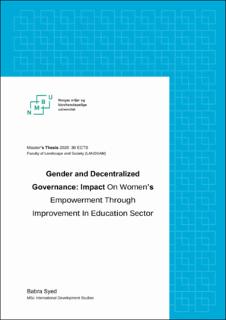| dc.description.abstract | Divergent ideologies, political predilections conjoined with unforeseen economic turmoil, elevated discontentment with the federally administered governance in Pakistan. Globally decentralized governance surged during the 1970s and early 1980s. However, its outcomes have been mixed. Pakistan’s government opted for decentralized governance in 2010 via 18th constitutional amendment. One of the factors behind this decision had been the growing unrest in the most marginalized provinces of the country, due to the belief in discriminatory treatment of some provinces by the federal government. This study was undertaken in the least developed province Balochistan of Pakistan, a region known for its tribal culture, and its perseverance in keeping its centuries old values alive. The aim was to explore, that after the devolution of power bestowed to a tribal mentality, marginalized region, what measures have been adopted by the Ministry of Education Balochistan, to ensure that gender biases are removed, and that girls/women are empowered through education. Did the region genuinely take ownership for its women’s empowerment pre decentralization or the rigid gender stereotyping prevailed? For this purpose, literature review was carried out and semi structured interviews were conducted with a group of professionals working in the government sector and the humanitarian sector. The study found that whatever the governance mechanism be, education sector is still facing the same problems that its confronted way back during its first education initiatives after the establishment of Pakistan. Hence, it will not be incorrect to say that it is the same old story, camouflaged under a different guise in this current millennium. The shortage of number of schools in districts, deficiency of better school buildings, and limited access to basic facilities such as drinking water and toilets in schools, and the deficit of trained teachers, and above all poverty, all these factors are still casting the shadow over the provincial education sector’s efforts, as it was effecting centralized governance for almost six decades. Though to an extent decentralized governance is playing an effective role in the provincial education sector, through initiatives like gender free schools, ALP (Accelerated Learning Programme), school transportation pilot project for girls schools, but it is still a very long journey; to make the education system gender sensitive, and to empower women through education diligently as a nation. | en_US |

